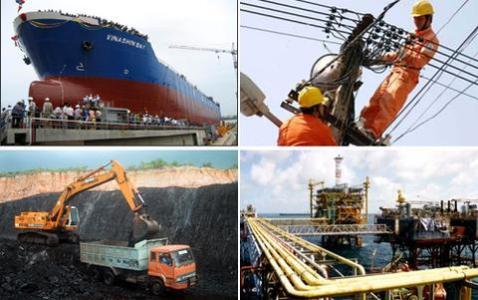When SOEs governed by 101 agencies
Published: 30/11/2012 09:34
Vietnam has 1,309 wholly state owned enterprises (SOEs) and they are managed by up to 101 stage bodies, according to Dr. Tran Tien Cuong, former head of the Enterprise Reform and Development Department of the Central Institute for Economic Management (CIEM).
State enterprises have too many "mothers" but it is very difficult to define which mother takes the responsibility for their children’s mistakes. This problem has been discussed in many forums and meetings, especially at the National Assembly sessions, when some state-owned groups, as the Vietnam Shipping Lines Group (Vinalines) and the Vietnam Shipbuilding Industry Group (Vinashin) incurred losses of up to billions of USD.
However, according to Mr. Nguyen Dinh Cung, CIEM deputy director, the implementation of this plan seems to be reluctant, hesitant and not really aggressive. Some even "talked back" that this plan cannot be completed before 2015 as committed. Source: Vietnamnet |
Provide by Vietnam Travel
When SOEs governed by 101 agencies - | vietnam travel company
You can see more
- Vietnamese airlines plan to expand new international flights
- Kien Giang promotes tourist attraction
- Giant projects heat Phu Quoc Island’s property market
- AirAsia plans Vietnam venture on Southeast Asia travel boom
- Ho Chi Minh City targets tourism revenue of $5.3 billion
- Vietnam active in G20 senior official meeting in Germany
- Banks struggle to raise capital
- Vietnam Airlines inks tourism promotion deal, Hai Phong City
enews & updates
Sign up to receive breaking news as well as receive other site updates!
- Banh Đa Cua - a traditional Hai Phong specialty
- Exploring Lai Chau cuisine
- Hanoi ranked top 3 cuisine in the world in 2023
- Beautiful resorts for a weekend escape close to Hanoi
- Travel trends in 2023
- In the spring, Moc Chau is covered in plum blossoms.
- The Most Wonderful Destinations In Sapa
- Top 3 Special festivals in Vietnam during Tet holiday - 2023
- 5 tourist hotspots expected to see a spike in visitors during Lunar New Year 2023
- How To Make Kitchen Cleaned
-
vietnam travel
http://www.vietnamtourism.org.vn " Vietnam Tourism: Vietnam Travel Guide, Culture, Travel, Entertainment, Guide, News, and...
-
Vietnam culture, culture travel
http://travel.org.vn " Vietnam culture
-
Vietnam travel, vietnam travel news, vietnam in photos
http://www.nccorp.vn " Vietnam travel, vietnam travel news, vietnam in photos
-
Vietnam tourism
http://www.vietnamtourism.org.vn " The official online information on culture, travel, entertainment, and including facts, maps,...
-
Vietnam Travel and Tourism
http://www.vietnamtourism.org.vn/ " Vietnam Travel, Entertainment, People, Agents, Company, Vietnam Tourism information.
-
Information travel online
http://www.travellive.org "Information travel online













